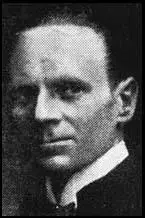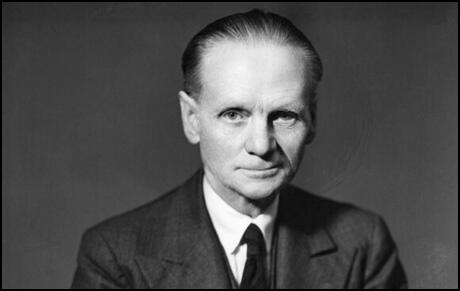Norman Angell

Norman Angell was born in Holbeach on 26th December 1872. At seventeen he emigrated to America but 1898 he moved to Paris where he became manager of the French edition of the Daily Mail. He was made aware of the dangers to world peace by the Moroccan crisis of 1905.
Angell became a pacifist and in his book The Great Illusion (1909), argued that a European war would be economically disadvantageous for victor as well as vanquished. The book had a tremendous impact on the intellectual community and study centres based on the book were established at universities and in industrial centres.
With the financial support of the the industrialist, Sir Richard Garton, and wealthy Quakers such as Joseph Rowntree, Angell established the Garton Foundation. In October 1913 he founded the pacifist journal, War and Peace. Contributors to the journal included Arthur Ponsonby, E. D. Morel and Ramsay MacDonald.
In an attempt to keep Britain out of a European war, Angell formed the Neutrality League. When this failed to achieve its goal, Angell joined Charles Trevelyan, E. D. Morel and Ramsay MacDonald to form the Union of Democratic Control. James Keir Hardie remarked that he was pleased that Angell was involved in this campaign: "I know of no one better fitted to guide the nation right through this dark crisis than he."
In 1920 Angell joined the Labour Party and in 1929 was elected to represent Bradford North in the House of Commons. The election of the Labour Government coincided with an economic depression and Ramsay MacDonald, the prime minister, was faced with the problem of growing unemployment. MacDonald asked Sir George May, to form a committee to look into Britain's economic problem. When the May Committee produced its report in July, 1931, it suggested that the government should reduce its expenditure by £97,000,000, including a £67,000,000 cut in unemployment benefits. MacDonald, and his Chancellor of the Exchequer, Philip Snowden, accepted the report but when the matter was discussed by the Cabinet, the majority voted against the measures suggested by May.

Ramsay MacDonald was angry that his Cabinet had voted against him and decided to resign. When he saw George V that night, he was persuaded to head a new coalition government that would include Conservative and Liberal leaders as well as Labour ministers. Most of the Labour Cabinet totally rejected the idea and only three, Philip Snowden, Jimmy Thomas and John Sankey agreed to join the new government. MacDonald was determined to continue and his National Government introduced the measures that had been rejected by the previous Labour Cabinet. Labour MPs were furious with what had happened and MacDonald was expelled from the Labour Party.
In October, Ramsay MacDonald called an election. The 1931 General Election was a disaster for the Labour Party with only 46 members winning their seats. This included Norman Angell who was defeated at Bradford North.
Angell returned to writing and his book, The Great Illusion: 1933, helped him win the 1933 Nobel prize for peace.
Angell was a great supporter of the International Brigades during the Spanish Civil War and in 1938 he joined Clement Attlee, William Gallacher, Tom Mann and Stafford Cripps in addressed the returning veterans.
Norman Angell died on 7th October 1967.
Primary Sources
(1) Union of Democratic Control Manifesto (August, 1914)
1. No Province shall be transferred from one Government to another without the consent by plebiscite or otherwise of the population of such Province.
2. No Treaty, Arrangement, or Undertaking shall be entered upon in the name of Great Britain without the sanction of Parliament. Adequate machinery for ensuring democratic control of foreign policy shall be created.
3. The Foreign Policy of Great Britain shall not be aimed at creating alliances for the purpose of maintaining the 'Balance of Power', but shall be directed to concerted action between the Powers, and the setting up of an International Council, whose deliberations and decisions shall be public, with such machinery for securing international agreement as shall be the guarantee of an abiding peace.
4. Great Britain shall propose, as part of the Peace Settlement, a plan for the drastic reduction, by consent, of the armaments of all the belligerent Powers, and to facilitate that policy shall attempt to secure the general nationalization of the manufacture of armaments and the control of the export of armaments by one country to another.
(2) The Union of Democratic Control (10th October, 1916)
The Council of the Union of Democratic Control re-affirms its unshaken conviction that a lasting settlement cannot be secured by a peace based upon the right of conquest and followed by commercial war, but only by a peace which gives just consideration to the claims of nationality, and which lays the foundation of a real European partnership.
(3) Norman Angell, After All (1951)
I joined the Labour Party not because it was Left Wing, but because it was definitely internationalists and would seem to be the group in the Labour Party which would serve my purpose best for propaganda along internationalist lines.
(4) James Hopkins, Into the Heart of the Fire: The British in the Spanish Civil War (1998)
Attlee, accompanied by Sir Stafford Cripps, Norman Angell, Will Lawther, and the Labour peer, Lord Strabolgi, addressed the returning veterans and the huge throng, speaking first of the shared pride that all the assembled felt. The future prime minister then declared, "You have stood for the cause of the workers." He welcomed them home as "heroes of the democratic faith, back once more to continue the struggle in this country." Others who spoke to the crowd were Cripps, the Communist MP William Gallacher, Tom Mann, and Will Lawther, president of the Miners' Federation who had lost a brother in Spain.

